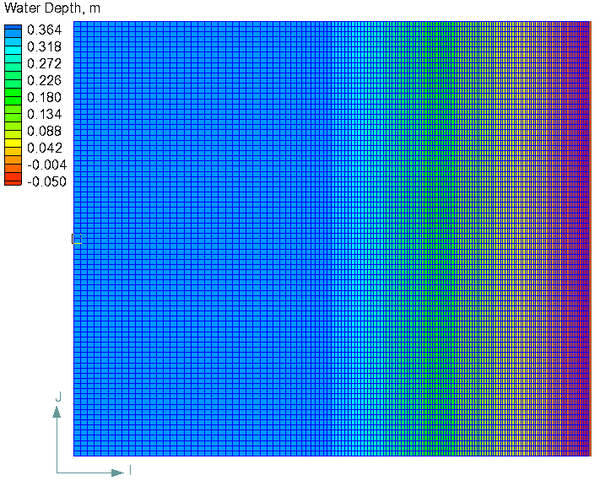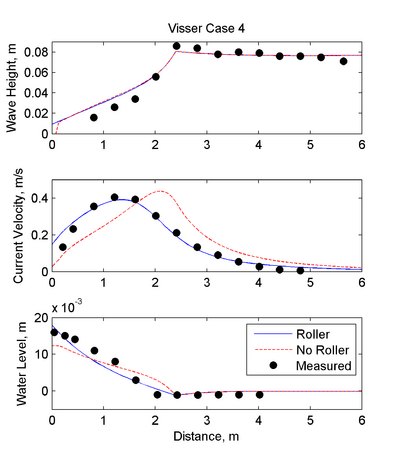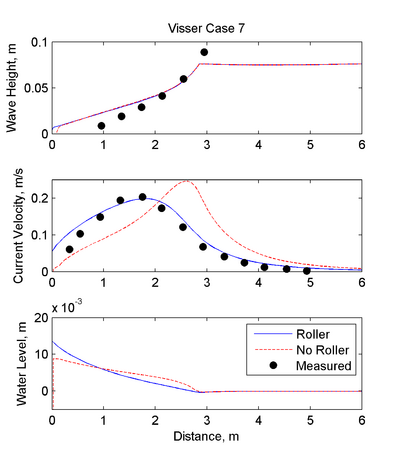Visser: Difference between revisions
| Line 17: | Line 17: | ||
''CMS-Flow Settings'' | |||
{| border="1" | {| border="1" | ||
! | ! Settings !! Value | ||
|- | |- | ||
| Solver || Implicit | | Solver || Implicit | ||
| Line 29: | Line 30: | ||
|- | |- | ||
| Ramp Duration || 3 hr | | Ramp Duration || 3 hr | ||
|} | |||
''CMS-Wave Settings'' | |||
{| border="1" | {| border="1" | ||
! | ! Settings !! Value | ||
|- | |- | ||
| Wave Breaking || Battjes and Janssen | | Wave Breaking || Battjes and Janssen | ||
Revision as of 14:45, 13 October 2010
Experimental Setup
In 1991, Visser conducted eight laboratory experiments of monochromatic wave on a planar beach and collected measurements on waves, currents and water levels. The bathymetry consisted of a 1:10 slope for the first 1-m seaward distance, a 1:20 slope for the next 5-m distance, followed by a 5.9 m distance of flat bottom to the wave generator. Both experiments had incident wave heights of 0.078 m, peak periods of 1.02 sec and an incident wave angle of 15.4°. Experiment 4 was run over a concrete bed and experiment 7 was run of a thin 0.005-0.01 m layer of gravel grouted on the concrete floor.
| Wave Parameter | Case 4 | Case 7 |
|---|---|---|
| Height | 0.08 m | 0.08 m |
| Period | 1.02 m | 1.02 m |
| Incident Angle | 15.4° | 15.4° |
Model Setup
The computational grid (shown in Figure 1) consists of 84 rows and 147 columns with a constant grid resolution in the longshore direction of 0.15 and a variable grid resolution between 0.04 and 0.15 m in the cross-shore direction. A zero water level was forced at the offshore boundary. A summary of some of the simulation settings used for both experiment cases are shown in the table below.
CMS-Flow Settings
| Settings | Value |
|---|---|
| Solver | Implicit |
| Time Step | 60 sec |
| Wetting and Drying Depth | 0.001 m |
| Simulation Duration | 3 hr |
| Ramp Duration | 3 hr |
CMS-Wave Settings
| Settings | Value |
|---|---|
| Wave Breaking | Battjes and Janssen |
| Diffraction coefficient | 3.0 |
| Bottom friction | Off |
| Steering Interval | 0.25 hr |
Results
The figures below show a comparison between measured and computed bed elevations.
| Calibration Parameters | Case 4 | Case 7 | Default |
|---|---|---|---|
| Wave-current bottom friction | Fredsoe 1984 | Fredsoe 1984 | Quadratic |
| Manning's n | 0.0115 | 0.018 | 0.025 |
| Roller | On | Off | Off |
| Roller dissipation coefficient | 0.1 | - | 0.1 |
| Roller efficiency coefficient | 0.8 | - | 1.0 |
References
- Visser, R. J. (1991) “Laboratory measurements of uniform longshore currents”. Coastal Engineering, 15, 563-593.


